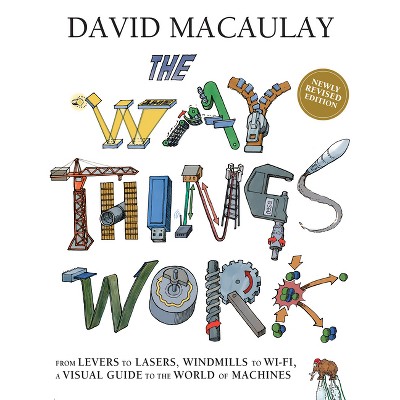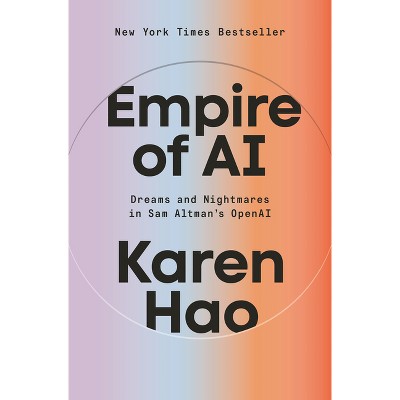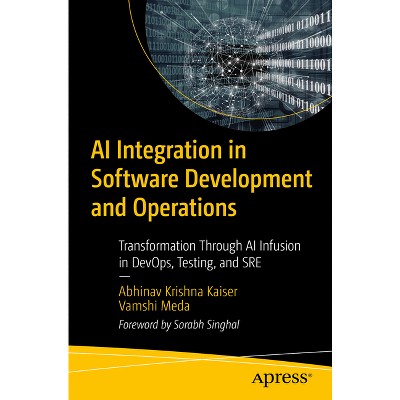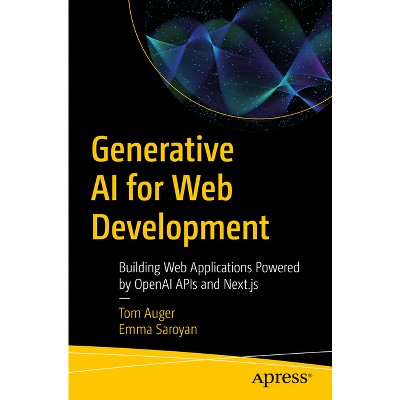AI Solutions for the United Nations Sustainable Development Goals (Un Sdgs) - by Tulsi Pawan Fowdur & Lavesh Babooram (Hardcover)

About this item
Highlights
- Learn the United Nations Sustainable Development Goals (UN SDGs) and see how machine learning can significantly contribute to their realization.
- About the Author: Dr. Tulsi Pawan Fowdur received his BEng (Hons) degree in Electronic and Communication Engineering with honors from the University of Mauritius in 2004.
- Computers + Internet, Intelligence (AI) & Semantics
Description
Book Synopsis
Learn the United Nations Sustainable Development Goals (UN SDGs) and see how machine learning can significantly contribute to their realization. This book imparts both theoretical knowledge and hands-on experience in comprehending and constructing machine learning-based applications for addressing multiple UN SDGs using JavaScript.
The reading begins with a delineation of diverse UN SDG targets, providing an overview of previous successful applications of machine learning in solving realistic problems aligned with these targets. It thoroughly explains fundamental concepts of machine learning algorithms for prediction and classification, coupled with their implementation in JavaScript and HTML programming.
Detailed case studies examine challenges related to renewable energy, agriculture, food production, health, environment, climate change, water quality, air quality, and telecommunications, corresponding to various UN SDGs. Each case study includes related works, datasets, machine learning algorithms, programming concepts, and comprehensive explanations of JavaScript and HTML codes used for web-based machine learning applications. The results obtained are meticulously analyzed and discussed, showcasing the pivotal role of machine learning in advancing the relevant SDGs.
By the end of this book, you'll have a firm understanding of SDG fundamentals and the practical application of machine learning to address diverse challenges associated with these goals.
What You'll Learn
- Understand the fundamental concepts of the UN SDGs, AI, and machine learning algorithms.
- Employ the correct machine learning algorithms to address challenges on the United Nations Sustainable Development Goals (UN SDGs)?
- Develop web-based machine learning applications for the UN SDGs using Javascript, and HTML.
- Analyze the impact of a machine learning-based solution on a specific UN SDG.
Who This Book Is For
Data scientists, machine learning engineers, software professionals, researchers, and graduate students.
From the Back Cover
Learn the United Nations Sustainable Development Goals (UN SDGs) and see how machine learning can significantly contribute to their realization. This book imparts both theoretical knowledge and hands-on experience in comprehending and constructing machine learning-based applications for addressing multiple UN SDGs using JavaScript.
The reading begins with a delineation of diverse UN SDG targets, providing an overview of previous successful applications of machine learning in solving realistic problems aligned with these targets. It thoroughly explains fundamental concepts of machine learning algorithms for prediction and classification, coupled with their implementation in JavaScript and HTML programming.
Detailed case studies examine challenges related to renewable energy, agriculture, food production, health, environment, climate change, water quality, air quality, and telecommunications, corresponding to various UN SDGs. Each case study includes related works, datasets, machine learning algorithms, programming concepts, and comprehensive explanations of JavaScript and HTML codes used for web-based machine learning applications. The results obtained are meticulously analyzed and discussed, showcasing the pivotal role of machine learning in advancing the relevant SDGs.
By the end of this book, you'll have a firm understanding of SDG fundamentals and the practical application of machine learning to address diverse challenges associated with these goals.
You will:
- Understand the fundamental concepts of the UN SDGs, AI, and machine learning algorithms.
- Employ the correct machine learning algorithms to address challenges on the United Nations Sustainable Development Goals (UN SDGs)?
- Develop web-based machine learning applications for the UN SDGs using Javascript, and HTML.
- Analyze the impact of a machine learning-based solution on a specific UN SDG.
About the Author
Dr. Tulsi Pawan Fowdur received his BEng (Hons) degree in Electronic and Communication Engineering with honors from the University of Mauritius in 2004. He was also the recipient of a Gold medal for having produced the best degree project at the Faculty of Engineering in 2004. In 2005 he obtained a full-time PhD scholarship from the Tertiary Education Commission of Mauritius and was awarded his PhD degree in Electrical and Electronic Engineering in 2010 by the University of Mauritius. He is also a Registered Chartered Engineer of the Engineering Council of the UK, Fellow of the Institute of Telecommunications Professionals of the UK, and a Senior Member of the IEEE. He joined the University of Mauritius as an academic in June 2009 and is presently an Associate Professor at the Department of Electrical and Electronic Engineering of the University of Mauritius. His research interests include Mobile and Wireless Communications, Multimedia Communications, Networking and Security, Telecommunications Applications Development, the Internet of Things, and AI. He has published several papers in these areas and is actively involved in research supervision, reviewing papers, and also organizing international conferences.
Lavesh Babooram received his BEng (Hons) degree in Telecommunications Engineering with Networking with honors from the University of Mauritius in 2021. He was also awarded a Gold medal for having produced the best degree project at the Faculty of Engineering in 2021. Since 2022, he has been an MSc by Applied Research student at the University of Mauritius. With in-depth knowledge of telecommunications applications design, analytics, and network infrastructure, he aims to pursue research in Networking, Multimedia Communications, Internet of Things, Artificial Intelligence, and Mobile and Wireless Communications. He joined Mauritius Telecom in 2022 and is currently working in the Customer Experience and Service Department as a Pre-Registration Trainee Engineer.











